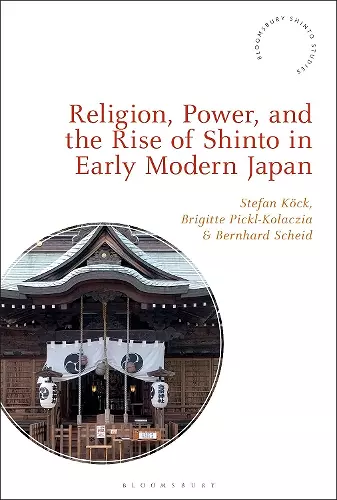Religion, Power, and the Rise of Shinto in Early Modern Japan
The dynamics of religion and state in Tokugawa Japan
Stefan Köck editor Bernhard Scheid editor Brigitte Pickl-Kolaczia editor
Format:Paperback
Publisher:Bloomsbury Publishing PLC
Published:17th Nov '22
Currently unavailable, and unfortunately no date known when it will be back

Exploring the interplay between religion and governance, Religion, Power, and the Rise of Shinto in Early Modern Japan reveals Shinto's growing significance in Tokugawa society.
This book offers a fresh perspective on the intricate relationship between religion and state during early modern Japan, particularly highlighting the evolving role of Shinto within the political and intellectual circles of Tokugawa Japan. Despite Buddhism being the dominant religious force used for state control, Religion, Power, and the Rise of Shinto in Early Modern Japan illustrates how Shinto gradually gained prominence and recognition among the elite, reflecting a significant shift in religious dynamics.
The first section delves into the Tokugawa government's strategy to manage the populace through Buddhism, while simultaneously elevating the status of Buddhism in relation to the Tokugawa dynasty. The subsequent chapters address the various religious protests that emerged during this era, including the suppression of Christians, the crackdown on heterodox Buddhist sects, and the marginalization of folk practitioners. This exploration reveals the complexities of religious authority and its impact on society.
In the final part, the book examines the motivations behind early Tokugawa Confucianism's interest in Shinto as a potential alternative to Buddhism. It also discusses the efforts to limit Buddhism's institutional power by reforming Shinto shrines, marking a critical phase in the so-called 'Shintoization of shrines' and the establishment of a distinct Shinto clergy. Overall, Religion, Power, and the Rise of Shinto in Early Modern Japan provides a comprehensive analysis of these transformative processes within the historical context.
[T]he expertise brought by the authors provides a valuable resource for scholars of this period, and the diverse topics covered show that the relationship of Shinto with institutional power in the Edo period is multifaceted and does not lend itself to any sort of simple, linear progression building up to the eventual centralization of shrines. * Reading Religion *
[T]his volume is heartily recommended to scholars of East Asian religions. * Religious Studies Review *
Religion, Power, and the Rise of Shinto in Early Modern Japan is an important contribution to the study of the relationship between religion and politics in the Edo period. ... offers a significant addition to our knowledge of the religious history of Edo Japan, which will be of great use to scholars and students alike. * Monumenta Nipponica *
This collection represents the highest standards of research on Shinto and should become required reading for Japanese studies. * Helen Hardacre, Professor of Japanese Religions and Society, Harvard University, USA *
Religion, Power, and the Rise of Shinto in Early Modern Japan makes a field-transforming contribution by highlighting the 17th century as a key moment, indeed a turning point, in Japanese religious history with important ramifications for the history of Shinto and government religious policy. * Luke Roberts, Professor of History, University of California, Santa Barbara, USA *
ISBN: 9781350231863
Dimensions: 232mm x 152mm x 18mm
Weight: 480g
304 pages